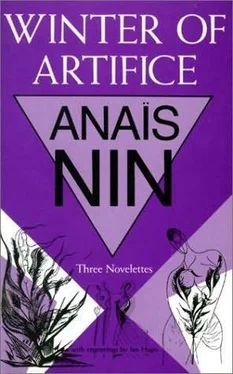Anaïs Nin - The Winter of Artifice
Здесь есть возможность читать онлайн «Anaïs Nin - The Winter of Artifice» весь текст электронной книги совершенно бесплатно (целиком полную версию без сокращений). В некоторых случаях можно слушать аудио, скачать через торрент в формате fb2 и присутствует краткое содержание. Год выпуска: 2007, Издательство: Sky Blue Press, Жанр: Классическая проза, на английском языке. Описание произведения, (предисловие) а так же отзывы посетителей доступны на портале библиотеки ЛибКат.
- Название:The Winter of Artifice
- Автор:
- Издательство:Sky Blue Press
- Жанр:
- Год:2007
- ISBN:нет данных
- Рейтинг книги:4 / 5. Голосов: 1
-
Избранное:Добавить в избранное
- Отзывы:
-
Ваша оценка:
- 80
- 1
- 2
- 3
- 4
- 5
The Winter of Artifice: краткое содержание, описание и аннотация
Предлагаем к чтению аннотацию, описание, краткое содержание или предисловие (зависит от того, что написал сам автор книги «The Winter of Artifice»). Если вы не нашли необходимую информацию о книге — напишите в комментариях, мы постараемся отыскать её.
“A handful of perfectly fold fables, and prose which is so daringly elaborate, so accurately timed… using words as magnificently colorful, evocative and imagist as any plastic combination on canvas but as mysteriously idiosyncratic as any abstract.”
—
The Winter of Artifice — читать онлайн бесплатно полную книгу (весь текст) целиком
Ниже представлен текст книги, разбитый по страницам. Система сохранения места последней прочитанной страницы, позволяет с удобством читать онлайн бесплатно книгу «The Winter of Artifice», без необходимости каждый раз заново искать на чём Вы остановились. Поставьте закладку, и сможете в любой момент перейти на страницу, на которой закончили чтение.
Интервал:
Закладка:
Human life at this moment seemed the unreal and miniature city, with too many boundaries, too many laws, and too many simplicities. Giving was the only flight in space permitted to whomever could abandon the human substance. Better to be made of red clay, as she was, for she would never die, and she would never die because of this joy that came in being more than one woman, and for the moment the woman the Voice wanted.
What would he demand of her?
While the Voice, who was no longer the Seer, talked, what she saw was the dark-skinned mythological crab, not quite a man, but an animal, with the cavernous, pre-historic sorrows of the monkey, the agedness of the turtle, the tenderness of the kangaroo, the facile humility of the dog.
In the Voice she felt the ugliness of tree roots, of the earth, and this terrific dark mute knowing of the animal, for though he was the one most aware of what happened inside others he was the one least aware of what happened in himself. It was too near. He could read the myth, and man’s dreams, but not in himself. The man had been denied. He was begging her to be made a person, a man. The man had been buried, had grown very old, withered, without having achieved his life on earth. That is what his eyes were asking for: a life on earth.
Lilith knew it was all based on a lie, and he could not be lied to. That is why he never lived: he had not learned to let himself be lied to. He will be another victim. I don’t know, I feel possessed and diabolical. I like the pleasure I give him.
It was a father I was looking for. And I found him. But he is a father who turns white with passion, who trembles with doubts and jealousies. He says that with me one travels so far away from reality that it is necessary to buy a return ticket. He is afraid of not being able to come back. I like him better serious than laughing; he doesn’t know how to laugh. His pranks are pranks of the mind, his humor is paradox, the reversal of ideas, the trickeries and trapeze stunts of ideas. He has not learned what I have learned—to not clutch at the perfume of flowers, to not touch the dew, to not tear all the curtains down, to let exaltation and breath rise, vanish. The perfume of the hours distilled only in silence, the heavy perfume of mysteries untouched by human fingers. Flesh touching flesh generates perfume. The friction of words generates only pain and division. To formulate without destroying, without tampering, without withering. An awe of the senses. Silence.
His understanding was infinite, like a sea, but Lilith was sailinon it alone. He was everywhere, immense, but not a man, because his understanding ended where the life of silence and mystery began.
He was walking at Lilith’s side now, in full daylight. His clothes hung about him as on a cross of wood. The clothes did not dress him, make him incarnate. His small hands made brusque gestures as if made of bones. Clothes take the shape of a man’s body, of his gestures. They bear the imprint of his character, his habits, his moods. The hat reveals if he is mellow and tolerant, if he is gay or lavish. Every line, fold, wrinkle, testifies to how he sits, to his tenderness or roughness, his sensuality or asceticism. The hat is moulded by the hand and is carried either with pride or insolence, with nonchalance or rigidity.
The Voice’s clothes did not fit him, were never a part of him. They were not moulded by his body, kneaded to his moods. Nothing that men wore seemed to be made for him. The tailors had not cut for his body, his body was not made for clothes. His hat stood stiffly detached from him. It seemed either too large or too small for him. Either his hats were formal and the face under it too lax, or the hat was humorous and nonchalant and his face tooserious and heavy. Or else he looked humiliated. In every detail his clothes were a misfit. The body was denied: it did not flow into the clothes, espouse them. There was a kind of blight upon his body; it was the idea made flesh, the idea always standing in the way of natural gestures, the idea upright and standing in the way of rhythm. His flesh was the color of death. He had died in the body and never been resurrected. It was heavy with melancholy, jealousy. The life of the mind had shrivelled the body too soon. It was a sad flesh tyrannized by the idea, drawn and quartered on a pattern, devoured by concepts. No matter how clear or divine the soul was, the flesh was dark and sad and muddied, like very ancient flesh exiled from joy and faith to the kingdom of thought.
When they returned from the theatre or a dance and stood before the door of her room there was always a pause. The Voice would say: “Come and talk with me a while longer. I hate to surrender you to sleep.”
If she refused she would find a note under her door the next day: “You belong to the night. I have to give you up to the night, to your mystery.” She smiled. Her mystery was so amazingly simple, but he could not understand it.
The next day he wrote her a long letter and slipped it under her door. Tied to it was a diminutive frog. “This,” he wrote, “is my transformation, to permit my entrance through the closed door.”
But this diminutive frog she held in the palm of her hand resembled him so much that it made her weep. Indeed the frog had come just as in the fairy tales; and just as in the fairy tales, she must keep her faith and her inner vision of him, must keep on believing in what lay hidden within this frog’s body. She must pretend not to notice that the Voice was born disguised, to test her love. If she kept her inner vision the disguise might be destroyed, the metamorphosis might occur.
She sat on the floor with the letter in her lap and the frog in the palm of her hand, weeping over his ugliness and humility and the faith she must hold on to. She remembered Djuna’s words: if you fall in love with a mirage your body will revolt.
She was asking him questions about his childhood. He stopped in the middle of a story to weep. “Nobody ever asked me anything about myself. I have listened to the confessions of others for twenty-five years. No one has ever turned and asked me about myself, has ever let me talk. No one has ever tried to divine my moods or needs. There are times, Lilith, when I wanted so much to confess to some one. I was filled with preoccupations. Do you know what I most fear in the world? To be loved as a father, a doctor. And it is always so I am loved. I am like a man who fears to be loved for his money.”
She used his own formulas against him. When he complained that she left him alone she gave him mysterious explanations: that the reality of living always brought tragedy, that she preferred the dream which never culminated in tragedy. The Voice was forced to admit he preferred the dream. The explanations enchanted and deluded him, and saved her from saying: “I don’t want you near me because I don’t love you.”
His concern with the accuracy of the psychological was so tremendous that once, after the discovery that she had lied, he said: “Let me solve this thing alone. Don’t bother about details of any kind. What do our lives matter when the whole manmade world is at stake.”
The only joy she experienced was that of being completely understood, justified, absolved in all but her relationship to him. He always asked her what she had been doing. No matter what she told him, even about the trivial purchase of a bracelet, the Voice pounced upon it with excitement and raised the incident to a complete, dazzling symbolical act, a part of a legend. The little incident was all he needed to compose and complete this legend. The bracelet had a meaning—every thing had a meaning. Every act revealed more and more clearly this divine pattern by which she lived and of which the Voice alone knew the entire design. Now he could see. He repeated over and over again: You see? You see? Lilith had the feeling that she had been doing extraordinary things. When she stepped into a shop and bought a bracelet it was not, as she thought, because of the love of its color, or shape, or because of her love of adornment. She was carrying in herself at that moment the entire drama of woman’s slavery and dependence. In this obscure little theatre of her unconscious the denouement brought about by the purchase of the bracelet was a drama which had everlasting repercussions on her daily life. It signified the desire to be bound to some one, it expressed a yielding of some kind. She had voluntarily bound and enslaved herself. You see? You see? Not only was the bracelet or the lovely moment spent before the shop window magnified and brought into violent relief—as an act full of implications, of repercussions—but all she had done during the week seemed to open like a giant hot-house camelia whose growth had been forced by a travail of creation from the moment she first drew breath.
Читать дальшеИнтервал:
Закладка:
Похожие книги на «The Winter of Artifice»
Представляем Вашему вниманию похожие книги на «The Winter of Artifice» списком для выбора. Мы отобрали схожую по названию и смыслу литературу в надежде предоставить читателям больше вариантов отыскать новые, интересные, ещё непрочитанные произведения.
Обсуждение, отзывы о книге «The Winter of Artifice» и просто собственные мнения читателей. Оставьте ваши комментарии, напишите, что Вы думаете о произведении, его смысле или главных героях. Укажите что конкретно понравилось, а что нет, и почему Вы так считаете.











